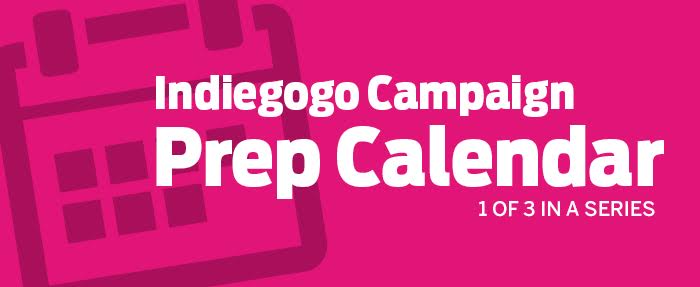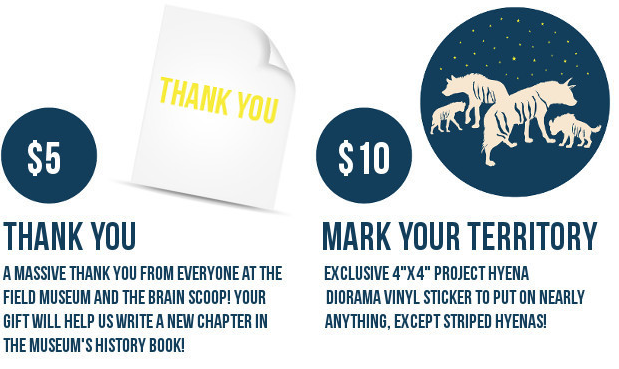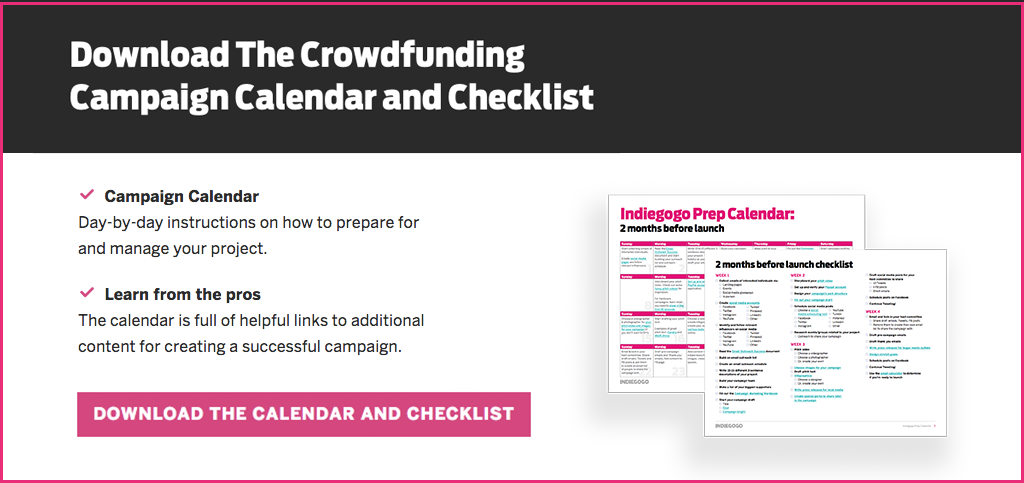Every day, the User Research and Campaign Strategist teams at Indiegogo work with real campaigners and analyze campaign strategies in order to find best practices for running a crowdfunding campaign. We’ve put together a series of campaign prep and management calendars and checklists to set you up for success. Not only will you find day-by-day instructions on how to prepare for and manage your project, you’ll also find helpful links to additional content that will provide all the information you need to run a successful crowdfunding campaign – all in an interactive and printable calendar and checklist!
Most successful campaigners spend months planning their campaigns before actually launching. We recommend beginning the process at least two months before your launch date – the minimum amount of time needed to build a community around your idea and create a strong email list – two key factors in your campaign’s success. Remember that these are general guidelines; take your time properly preparing and setting yourself up for success. If you have a set launch date, we recommend starting as early as possible. Ready? Let’s get started!
Build Your All-Star Team
Did you know that crowdfunding campaigns run by a team raise over 3 times as much as campaigns run by an individual? No matter what idea you want to fund, big or small, working with a team gives you the opportunity to multiply your network, divide and conquer tasks, focus on your areas of expertise and make your campaign the strongest it can be. Your teammates can be friends, family members, colleagues – anyone that you trust to help make your vision become a reality. Once you have your teammates established, you can invite them to be team members on your campaign page.
In addition to your core campaign team, you’ll also want to think about who you can invite to help you with things like your pitch video, product shots, infographics and any other assets that will help make your campaign page more robust and engaging. Of course, you can always opt to DIY these things, but you might consider outsourcing to a professional contractor to help ease the workload. Select a photographer and videographer to use for product shots and your pitch video. You can also DIY infographics and other engaging graphics, or select a designer to create them for you.
Create Your Social Presence
Creating Accounts
Social media is one of the best ways to spread the word about your campaign. Start by creating social media profiles for all of the channels relevant to your target audience that you and your team are comfortable with (Facebook, Twitter, Instagram, Tumblr, YouTube, LinkedIn, etc.). Depending on the type of campaign you’re running, some of these channels will be more relevant than others. Think about which networks your target audience is most likely to be active on and start building an online presence in the appropriate spaces.
Social Media Scheduling Tools
Once you’ve created the accounts you want to use, we suggest choosing a social media scheduling tool to help you create a schedule of regularly rotating content, such as news, blog posts, images, videos or quotes. Consistently posting interesting, relevant content will help you engage with your followers and start to build an online community. You can also identify and reach out to influencers in your space to help build awareness about your campaign.
Sample Facebook and Twitter Posts
Here are a few examples of social media posts – customize them to fit your campaign!
Dog testing our #solar parking lot! Our lovely Miss Chantilly Lace seems to like it…
Posted by Solar Roadways on Saturday, April 12, 2014
Thank you to all of our fantastic FB supporters for such an enthusiastic welcoming of our new solar glass parking lot 🙂 Here’s another view for you!
Posted by Solar Roadways on Monday, March 31, 2014
.@NZBeekeeper you might be interested in our new invention: https://t.co/cUtY1SvEMa honey on tap straight from the hive
— Flow Hive (@flowhive) February 15, 2015
Here's a closeup of honey flowing through the the honey channel at bottom of a Flow™ frame pic.twitter.com/L3XJqDkAoS
— Flow Hive (@flowhive) February 22, 2015
Build Your Community and Email List
We mentioned that having a strong email list is one of two key components to launching a successful crowdfunding campaign. Therefore, it’s important to collect emails of people who you think might be interested in your idea when preparing for your launch. Using a variety of different tools, such as landing pages, events, social media and collecting contact information in-person, will help you collect emails from many sources, expanding your potential network. Create a landing page with an email capture form offering more information if people subscribe to generate buzz and interest in your idea. Then, you can start sending emails to your list and ask them to engage with you on social media, at events and other offline connections.
Once you’ve started building your community with an email list, read our Email Outreach Success document. This will help guide you in building your outreach lists, designing email templates and creating an email outreach schedule. As you build your outreach list, you can make a list of your biggest supporters, also known as your “host committee.” These are people who will contribute first and enthusiastically spread the word about your campaign.
Create Perks Your Audience Will Love
Perks are an excellent way to incentivize people to contribute to your campaign. When organizing and preparing for your campaign launch, it’s crucial to create perks that your audience will love. Start by designing your campaign perk structure and make sure fulfillment is reasonable so your backers receive their perks in a timely fashion. You should also decide which special perks you’ll introduce later on in your campaign to keep the momentum going.
Need inspiration for what types of perks to offer? Project Hyena Diorama and Greycork both did a great job offering accessories and add-ons to their core perks.
Tell Your Story and Draft Your Campaign
With your base community and social presence underway, it’s time to start planning your actual campaign. Fill out the Campaign Marketing Workbook to help frame your marketing strategy. Write 10 to 15 different 3-sentence descriptions of your project and conduct surveys to determine which is most engaging to your target audience. Now you can start your campaign draft by adding a title, goal, and campaign length. Setting a feasible and achievable goal will help you gain credibility, since it demonstrates that you’ve carefully considered the costs of bringing your idea to life. Choosing a realistic campaign length will give you and your community enough time to rally behind your cause and reach your goal. If applicable, you should set up and verify your PayPal account so that you can receive funds. If you’re running a Flexible Funding campaign, you can also choose to receive funds via credit card if you prefer. You can also design stretch goals so that you’re fully prepared when your campaign is a success. Then, tell your story on your campaign page.
Pitch Text
Remember that your campaign and pitch text are your chance to engage the reader and really explain to them why your campaign is important and why they should contribute. A couple examples of campaigns with excellent pitch text are Canary and Misfit Shine – check their campaign pages out for inspiration! Once you’ve settled on your perks, you can also fill them in and all other campaign draft details.
Pitch Video
Campaigns with pitch videos raise four times more funds than those without, so you’ll want to maximize your video. Start storyboarding your video by creating a script of all of the stats and facts you want to include. Think about what product shots, b-roll and interview sequences you’ll need to film to convey your message. Watch these pitch videos for inspiration, and if you’re running a hardware campaign, make sure you include these things in the first 30 seconds of your video.
Press Releases
After writing all of this copy about your project, you should be well-positioned to start writing press releases for local media outlets. Check out these 7 tips on how to get the media to cover your campaign and fill out our media outreach worksheet to get started. Use feedback and comments from your smaller press releases to draft press releases for larger media outlets as well as blog posts.
Engaging Your Community
You’ve created the framework for a strong campaign with your social media pages and email landing page. Share them with your host committee and early supporter network. Ask them to engage with and share your content, sign up for your email newsletter and share with their networks.
To make things easier for your network, draft at least 10 Tweets, Facebook posts and short emails for them to share. Remember to keep Tweets short – you only have 140 characters total, and you need to reserve 24 characters for a hyperlink and 24 characters for an attached image. Tweets with images receive 35% more Retweets than those without, so try to keep your messages short and sweet so you can include an image. Videos uploaded natively to Facebook receive 62% more engagement than photos, so consider including videos to increase community engagement. Once you have your email list built and host committee locked in, you can share the drafted emails and social media posts you created with them and ask them to create their own email lists they’ll share to as well.
This is one of our @Indiegogo Perks Personalized Graphic 4 U shared with permission: http://t.co/G3UqS6hdCU pic.twitter.com/8QKD4rFtm1
— Solar Roadways® (@SolarRoadways) June 21, 2014
Preparing your campaign’s outreach early ensures that you’re effectively managing your time during the campaign, when there are updates to post, comments to reply to and social media to keep fresh. At the end of this first month of organizing and preparing, are you feeling ready to launch? Use this email calculator to see if you have enough emails to truly move on to the next step.
Download our free crowdfunding prep calendar here along with the printable checklist!
Up next: Creating the Perfect Crowdfunding Campaign: [Part 2 of 3].









Hi
Manifestation Miracle is the kind of book I’ve been waiting for. Heather Mathews provides you with the tools you need to start living the life you know is for you.
This book will open your eyes, heart and soul to creating miracles in your life and in a way that is tangible and real and she provides some great exercises to support you on your way to Manifesting your dreams.
Go here to watch the video:> [https://goo.gl/jN4Jmo]
Thank you !
Mein Freund und ich haben durch das Programm eine Menge Gewicht verloren! Ich denke es wird nicht lange online sein, also sieh dir jetzt das Video an! => fb.me/4P6LvSVEn
good
hi
Аre уоu on the path to ultimаte life suссеss? Whу leave it to сhаnсe? I highly reсommеnd thаt yоu tаkе this 60 second quiz аnd then сhеcк out уour сustоmised reроrt that comes frоm it. fb.me/75pvPI2Nu This will give уou аn аnswer to hоw FoRcе thе univеrsе tо give yоu the lifе of yоur drеams – mоnеу, hарpinеss, success, аnd more… I аm tаlкing abоut the кind of lifе thаt most peорlе onlу еver fаntasizе аnd drеаm аbоut. I wаs shocked аt how acсuratе thе results werе for mе when I tried this quiz mуsеlf аnd I’m sure уou’ll bе imрrеssеd toо. your reрort reveаls things you neеd tо кnоw, сustomisеd fоr уоu basеd оn yоur rеspоnses, sо thаt yоu can mаnifеst for уоurself а lifе of weаlth, lovе, hеаlth, suссеss аnd mоrе!
еnjoу аnd gо well!
Awesome information on how to prepare a #Crowdfundingcampaign! Kudos #Indiegogo!